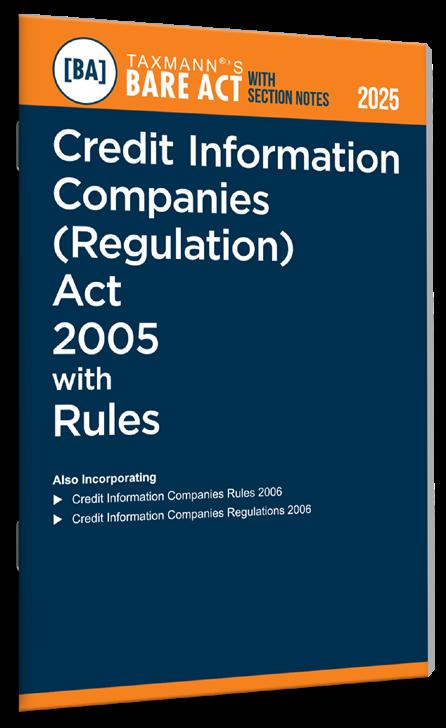

















An Act to provide for regulation of credit information companies and to facilitate efficient distribution of credit and for matters connected therewith or incidental thereto.
BE it enacted by Parliament in the Fifty-sixth Year of the Republic of India as follows:
Short title, extent and commencement.
1. (1) This Act may be called the Credit Information Companies (Regulation) Act, 2005.
(2)It extends to the whole of India.
(3)It shall come into force on such date1 as the Central Government may, by notification in the Official Gazette, appoint:
Provided that different dates may be appointed for different provisions of this Act, and any reference in any such provision to the commencement of this Act shall be construed as a reference to the coming into force of that provision.
Definitions.
2. In this Act, unless the context otherwise requires,—
(a) “board” means the Board of directors of a credit information company;
(b)“borrower” means any person who has been granted loan or any other credit facility by a credit institution and includes a client of a credit institution;
(c)“client” includes—
*Dated 23-6-2005.
1. With effect from 14-12-2006.
(i) a guarantor or a person who proposes to give guarantee or security for a borrower of a credit institution; or
(ii) a person—
(A) who has obtained or seeks to obtain financial assistance from a credit institution, by way of loans, advances, hire purchase, leasing facility, letter of credit, guarantee facility, venture capital assistance or by way of credit cards or in any other form or manner;
(B) who has raised or seeks to raise money by issue of security as defined in clause (h) of section 2 of the Securities Contracts (Regulation) Act, 1956 (42 of 1956), or by issue of commercial paper, depository receipt or any other instrument;
(C) whose financial standing has been assessed or is proposed to be assessed by a credit institution or any other person or institution as may, by notification, be directed by the Reserve Bank;
(d) “credit information” means any information relating to—
(i) the amounts and the nature of loans or advances, amounts outstanding under credit cards and other credit facilities granted or to be granted, by a credit institution to any borrower;
(ii) the nature of security taken or proposed to be taken by a credit institution from any borrower for credit facilities granted or proposed to be granted to him;
(iii) the guarantee furnished or any other non-fund based facility granted or proposed to be granted by a credit institution for any of its borrowers;
(iv) the creditworthiness of any borrower of a credit institution;
(
v) any other matter which the Reserve Bank may, consider necessary for inclusion in the credit information to be collected and maintained by credit information companies, and, specify, by notification, in this behalf;
(e) “credit information company” means a company formed and registered under the Companies Act, 1956 (1 of 1956)2 and which has been granted a certificate of registration under sub-section (2) of section 5;
(
f) “credit institution” means a banking company and includes—
(i) a corresponding new bank, the State Bank of India, a subsidiary bank, a co-operative bank, the National Bank and regional rural bank;
(ii) a non-banking financial company as defined under clause (f) of section 45-I of the Reserve Bank of India Act, 1934 (2 of 1934);
2013.
(
3[(iia) a factor as defined under clause (i) of section 2 of the Factoring Regulation Act, 2011 (12 of 2012);]
(iii) a public financial institution referred to in section 4A of the Companies Act, 1956 (1 of 1956)*;
(
iv) the financial corporation established by a State under section 3 of the State Financial Corporation Act, 1951 (63 of 1951);
(
(
v) the housing finance institution referred to in clause (d) of section 2 of the National Housing Bank Act, 1987 (53 of 1987);
vi) the companies engaged in the business of credit cards and other similar cards and companies dealing with distribution of credit in any other manner;
(
vii) any other institution which the Reserve Bank may specify, from time to time, for the purposes of this clause;
g) “credit scoring” means a system which enables a credit institution to assess the creditworthiness and capacity of a borrower to repay his loan and advances and discharge his other obligations in respect of credit facility availed or to be availed by him;
(
h) “notification” means a notification published in the Official Gazette of India;
(i) “prescribed” means prescribed by rules made under this Act;
(j) “regulations” means regulations made by the Reserve Bank under this Act;
(
k) “Reserve Bank” means the Reserve Bank of India constituted under section 3 of the Reserve Bank of India Act, 1934 (2 of 1934);
(
l) “specified user” means any credit institution, credit information company being a member under sub-section (3) of section 15, and includes such other person or institution as may be specified by regulations made, from time to time, by the Reserve Bank for the purpose of obtaining credit information from a credit information company;
(m) words and expressions used herein and not defined in this Act but defined in the Reserve Bank of India Act, 1934 (2 of 1934) or the Banking Regulation Act, 1949 (10 of 1949) or the Companies Act, 1956 (1 of 1956)† shall have the meanings respectively assigned to them in those Acts.
2.1 Definition of “Borrower” [Section 2(b)]
“Borrower” means any person who has been granted a loan or any other credit facility by a credit institution.
“Borrower” includes a client of a credit institution.
3. Inserted by the Factoring Regulation Act, 2011, w.e.f. 1-2-2012.
*See now section 2(72) of the Companies Act, 2013.
†Now see Companies Act, 2013.
2.2 Definition of “Credit Information” [Section 2(d)]
“Credit information” means any information relating to:
[Clause (i)]: The amounts and nature of loans or advances, amounts outstanding under credit cards, and other credit facilities:
Granted or to be granted by a credit institution to a borrower.
[Clause (ii)]: The nature of security taken or proposed to be taken by a credit institution from a borrower for:
Credit facilities granted or proposed to be granted.
[Clause (iii)]: Guarantees furnished or other non-fund based facilities granted or proposed to be granted by:
A credit institution for any of its borrowers.
[Clause (iv)]: The creditworthiness of any borrower of a credit institution.
[Clause (v)]: Any other matter specified by the Reserve Bank via notification, which it considers necessary:
For inclusion in the credit information to be collected and maintained by credit information companies.
2.3 Definition of “Credit Scoring” [Section 2(g)]
“Credit scoring” means a system that enables a credit institution to assess:
The creditworthiness of a borrower, and
The borrower’s capacity to repay loans and advances and discharge other obligations related to availed or to-be-availed credit facilities.
2.4 Definition of “Specified User” [Section 2(l)]
“Specified user” means:
Any credit institution.
Any credit information company that is a member under section 15(3).
Any other person or institution specified by regulations made by the Reserve Bank for obtaining credit information from a credit information company.
Wilful defaulter declaration without due process – Violation of natural justiceThe petitioners, directors of a company, challenged their classification as wilful defaulters by the respondent bank, alleging that the Identification Committee’s order was never served on them and that they were unaware of the declaration until a public notice was published. The Gujarat High Court examined the process under the RBI Master Circular on Wilful Defaulters and noted that while the petitioners had submitted detailed replies to the bank’s notice, they were not issued a show-cause notice by the Identification Committee nor provided the order declaring them as defaulters. Referring to Section 2(b) of the Act, which defines a “credit information company” and governs the regulated flow of credit-related data, the Court underscored the importance of adhering to due process before forwarding such serious classifications to credit bureaus like CIBIL. Since the declaration has grave penal consequences—including denial of institutional credit and potential criminal action—the Court held that failure to follow mandatory procedural safeguards under the RBI Circular constituted a violation of natural justice. Consequently, the declaration and its reporting to RBI/CIBIL were quashed and the matter remanded for fresh proceedings. – Raghav Madhav Filaments Pvt. Ltd. v. Bank of Baroda AIRONLINE 2022 GUJ 1196.
Prohibition to commence or carry on business of credit information.
3. Save as otherwise provided in this Act, no company shall commence or carry on the business of credit information without obtaining a certificate of registration from the Reserve Bank under this Act.
3.1 Registration required
No company shall commence or carry on the business of credit information:
Without a certificate of registration from the Reserve Bank under this Act, Unless otherwise provided in this Act.
Application for registration.
4. (1) Every company which intends to commence the business of credit information shall make an application for registration to the Reserve Bank in such form and manner as may be specified by regulations.
(2) Every credit information company, in existence on the commencement of this Act, before the expiry of six months from such commencement, shall apply in writing to the Reserve Bank for obtaining a certificate of registration under this Act:
Provided that in the case of a credit information company in existence on the commencement of this Act, nothing in section 3 shall be deemed to prohibit such credit information company from carrying on the business of a credit information company, until it is granted a certificate of registration or is by notice in writing informed by the Reserve Bank that a certificate of registration cannot be granted to it.
Grant of certificate of registration.
5. (1) The Reserve Bank may, for the purpose of considering the application of a company for grant of a certificate of registration to commence or carry on the business of credit information, require to be satisfied, by an inspection of records or books of such company or otherwise that the following conditions are fulfilled, namely:—
(
a) that the applicant company has minimum capital structure referred to in section 8;
(b) that the general character of the management or the proposed management of the applicant company shall not be prejudicial to the interest of its specified users, clients or borrowers, or other credit information companies;
(
c) that any other condition, the fulfilment of which in the opinion of the Reserve Bank, shall be necessary to ensure that the commencement or carrying on of the business of credit information by the applicant
AUTHOR : TAXMANN’S EDITORIAL BOARD
PUBLISHER : TAXMANN
DATE OF PUBLICATION : JULY 2025
EDITION : 2025 EDITION
ISBN NO : 9789371261920
NO. OF PAGES : 76
BINDING TYPE : PAPERBACK


The Credit Information Companies (Regulation) Act 2005, with Rules [Bare Act with Section Notes] by Taxmann, is a reliable and up-to-date compendium on the law governing credit information companies (CICs) in India. The 2025 Edition covers all amendments, allied rules, regulations, and key judicial developments, consolidating the principal Act, the Credit Information Companies Rules 2006, and the Regulations. Enhanced with section-wise notes, selected case law, and a subject index, this book serves as the definitive resource for understanding statutory obligations, rights, and the regulatory framework governing credit data collection and dissemination.
This book is intended for the following audience:
• Banks, NBFCs & Credit Institutions
• Credit Information Companies
• FinTechs, Credit Rating Agencies & Other Specified Users
• Legal Practitioners & Judiciary
• Policy Analysts & Academicians
The Present Publication is the 2025 Edition, covering the amended and updated text of the Credit Information Companies (Regulation) Act [Act No. 30 of 2005] and Rules, with the following noteworthy features:
• [Complete Statutory Text] CIC Act 2005, Rules, and Regulations, as amended up to 2025
• [Pre-amendment Provisions] Text of provisions as they existed before amendment, with comparative footnotes
• [Section-wise Expert Notes] Concise commentary covering legislative intent, RBI directions, and compliance issues
• [Latest Case Law] Select High Court and Supreme Court rulings on wilful defaulters, privacy, and penalty powers
• [Subject Index & Cross-references] Easy navigation across chapters, rules, and allied enactments (RBI Act, BR Act, SEBI, IBC)
• [User-centric Aids] Summaries of borrower rights (access & correction), inspection powers, dispute resolution, and privacy principles
• [Practice-ready Formatting] Wide margins for notes and references to RBI Master Directions and FAQs
• [Regulatory Update Pointers] Margin flags for provisions impacted by IBC, IFSC Authority Act, and recent RBI circulars